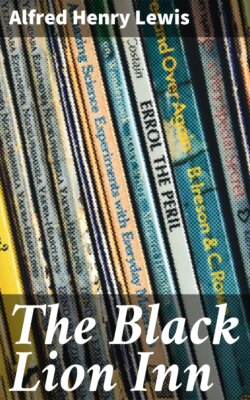Читать книгу The Black Lion Inn - Alfred Henry Lewis - Страница 10
На сайте Литреса книга снята с продажи.
Оглавление
An’ when he comes to them, he asks:
“Have you killed an’ cooked the deer which was sent you by the Ugly Elk?” An’ the hunters laugh an’ say: “Yes; he is killed an’ cooked.” Then they take him to the peeled pine tree, an’ tell him of Forked Tongue an’ his fate; an’ after cooling a great shin-bone in the river, they wrap it in bark an’ grass an’ say:
“Carry that to the Ugly Elk that he may know his deer is killed an’ cooked.”
While he is returning to Ugly Elk much disturbed, Moh-Kwa tells Running Water how Forked Tongue made his evil plan; an both Running Water when he hears, an’ Ugly Elk when he hears, can hardly breathe for wonder. An’ the Ugly Elk cannot speak for his great happiness when now that Running Water is still alive an’ has not made a joke of his ugliness nor laughed. Also, Ugly Elk gives Moh-Kwa that bowl of molasses of which Forked Tongue would cheat him.
The same day, Moh-Kwa brings the Firelight to the lodge of Ugly Elk, an’ she an’ Running Water are wed; an’ from that time she dwells in the tepee of Running Water, even unto the day when he is named Kill-Bear an’ made chief after Ugly Elk is no more.
“It is ever,” said the Jolly Doctor, beaming from one to another to observe if we enjoyed Sioux Sam’s story with as deep a zest as he did, “it is ever a wondrous pleasure to meet with these tales of a primitive people. They are as simple as the romaunts invented and told by children for the amusement of each other, and yet they own something of a plot, though it be the shallowest.”
“Commonly, too, they teach a moral lesson,” spoke up the Sour Gentleman, “albeit from what I know of savage morals they would not seem to have had impressive effect upon the authors or their Indian listeners. You should know something of our Indians?”
Here the Sour Gentleman turned to the Old Cattleman, who was rolling a fresh cigar in his mouth as though the taste of tobacco were a delight.
“Me, savey Injuns?” said the Old Cattleman. “Which I knows that much about Injuns it gets in my way.”
“What of their morals, then?” asked the Sour Gentleman.
“Plumb base. That is, they’re plumb base when took from a paleface standp’int. Lookin’ at ’em with the callous eyes of a savage, I reckons now they would mighty likely seem bleached a whole lot.”
Discussion rambled to and fro for a time, and led to a learned disquisition on fables from the Jolly Doctor, they being, he said, the original literature of the world. With the end of it, however, there arose a request that the Sour Gentleman follow the excellent examples of the Jolly Doctor and Sioux Sam.
“But I’ve no invention,” complained the Sour Gentleman. “At the best I could but give you certain personal experiences of my own; and those, let me tell you, are not always to my credit.”
“Now I’ll wager,” spoke up the Red Nosed Gentleman, “now I’ll wager a bottle of burgundy—and that reminds me I must send for another, since this one by me is empty—that your experiences are quite as glorious as my own; and yet, sir,”—here the Red Nosed Gentleman looked hard at the Sour Gentleman as though defying him to the tiltyard—“should you favor us, I’ll even follow you, and forage in the pages of my own heretofore and give you a story myself.”
“That is a frank offer,” chimed in the Jolly Doctor.
“There is no fault to be found with the offer,” said the Sour Gentleman; “and yet, I naturally hesitate when those stories of myself, which my poverty of imagination would compel me to give you, are not likely to grace or lift me in your esteem.”
“And what now do you suppose should be the illustrative virtues of what stories I will offer when I tell you I am a reformed gambler?”
This query was put by the Red Nosed Gentleman. The information thrown out would seem to hearten the Sour Gentleman not a little.
“Then there will be two black sheep at all events,” said the Sour Gentleman.
“Gents,” observed the Old Cattleman, decisively, “if it’ll add to the gen’ral encouragement, I’ll say right yere that in Arizona I was allowed to be some heinous myse’f. If this is to be a competition in iniquity, I aims to cut in on the play.”
“Encouraged,” responded the Sour Gentleman, with just the specter of a vinegar smile, “by the assurance that I am like to prove no more ebon than my neighbors, I see nothing for it save to relate of the riches I made and lost in queer tobacco. I may add, too, that this particular incident carries no serious elements of wrong; it is one of my cleanest pages, and displays me as more sinned against than sinning.”
